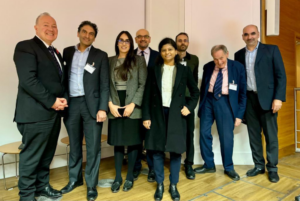Research
Using Machine Learning to detect and predict loosening of the femoral component of an uncemented total hip replacement’
Vipin Asopa is a consultant orthopaedic surgeon, specialising in Hip & Knee Surgery, and an ORUK Inspiration Fund Clinical Researcher. As the audit and quality improvement lead at South West London Elective Orthopaedic Centre (SWLEOC), he is interested in improving quality of patient care. His research proposes using technology to detect and predict failing total hip replacements before patients or doctors become aware of a problem.
A common reason for failure of a total hip replacement is aseptic loosening, which can cause pain and suffering for patients. It is difficult to predict which patients will develop aseptic loosening, however, certain types of implant designs may be more at risk. The research aims to help identify problems early, as well as help implant designers and companies to assess whether their hip replacements are at risk of failure.
The study uses data from patients who are part of a pre-existing study and have a known type of implant. Following their consent, their x-ray images were downloaded and analysed by a group of doctors. The images were then used to train a machine learning algorithm to detect failed hips. The consultant orthopaedic surgeon shared: ‘Not only is it possible to use AI to identify features of a failing total hip replacement (loosening), but we believe, that we are the first to show that AI can predict which hip replacements will fail prematurely.’
This technology could support improved follow-up for patients at risk of failure and reduce cost to the NHS. It can also help reassure lower risk patients their total hip replacement is less likely to fail. Mr. Asopa said, ‘We’ve got limited data, because it’s quite difficult to get good quality data, but we’re trying to get other datasets to help us. We’re very excited!’ The team behind the project are considering collaborations with other groups in the UK, Europe and the US. In the future, Vipin hopes the technology will be installed in hospitals and lead to the earlier detection of problems in patients who have had a total hip replacement.
According to the consultant orthopaedic surgeon, ‘This fellowship helped me develop skills to lead a research team and understand issues around governance and data. Most challenges can be overcome by good communication and explaining how you’re trying to help patients. From a clinical perspective, it has helped me to think about surgery and what I tell patients on a day-to-day basis.’ The researcher added, ‘We are very grateful for the support provided by Orthopaedic Research UK and hope that this can provide benefit to patients.’

Acknowledgements:
- Mr Peter Harris – Research Team Lead, Nielsen IQ
- Mr Keith Tucker – Retired orthopaedic surgeon and Chairman of ODEP and Beyond Compliance
- Prof. Richard Field – Chief Investigator of the project.
- Nick Botfield – IT department at Epsom and St. Helier University Hospital
- Prof. Deiary F Kader – Director of Research at SWLEOC
- Prof. David Sochart – Orthopaedic Surgeon
- Research team and junior doctors at SWLEOC
- Dr. Samantha Jones – Associate Director of Research at SWLEOC
- Ms Irrum Afzal – Research Manager